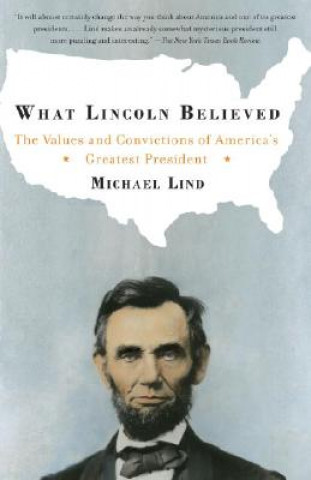
Kód: 12050655
What Lincoln Believed: The Values and Convictions of America's Greatest President
Autor Michael Lind
Few biographers and historians have taken Lincoln's ideas seriously or placed him in the context of major intellectual traditions. In "What Lincoln Believed, the most comprehensive study ever written of the thought of America's mo ... celý popis
- Jazyk:
 Angličtina
Angličtina - Vazba: Brožovaná
- Počet stran: 358
Nakladatelství: ANCHOR, 2006
- Více informací o knize

Mohlo by se vám také líbit
-

She Who Remembers
345 Kč -

Lawrence Police Department
657 Kč -

Plainsboro
657 Kč -

God Chasers: Interactive Study Guide
370 Kč -

Hummingbird on the Left
525 Kč -

Twinkle, a Christmas Story
359 Kč -

The Life and Adventures of John A. Murrell, the Great Western Land Pirate
842 Kč
Dárkový poukaz: Radost zaručena
- Darujte poukaz v libovolné hodnotě a my se postaráme o zbytek.
- Poukaz se vztahuje na celou naši nabídku.
- Elektronický poukaz vytisknete z e-mailu a můžete ihned darovat.
- Platnost poukazu je 12 měsíců od data vystavení.
Více informací o knize What Lincoln Believed: The Values and Convictions of America's Greatest President
Nákupem získáte 59 bodů
 Anotace knihy
Anotace knihy
Few biographers and historians have taken Lincoln's ideas seriously or placed him in the context of major intellectual traditions. In "What Lincoln Believed, the most comprehensive study ever written of the thought of America's most revered president, Michael Lind provides a resource to the public philosophy that guided Lincoln as a statesman and shaped the United States. Although he is often presented as an idealist dedicated to political abstractions, Lincoln was a pragmatic politician with a lifelong interest in science, technology, and economics. Throughout his career he was a disciple of the Kentucky senator Henry Clay, whose "American System" of government support for industrial capitalism Lincoln promoted when he served in the Illinois statehouse, the U.S. Congress, and the White House. Today Lincoln is remembered for his opposition to slavery and his leadership in guiding the Union to victory in the Civil War. But Lincoln's thinking about these subjects is widely misunderstood. His deep opposition to slavery was rooted in his allegiance to the ideals of the American Revolution. Only late in his life, however, did Lincoln abandon his support for the policy of "colonizing" black Americans abroad, which he derived from Henry Clay and Thomas Jefferson. Lincoln and most of his fellow Republicans opposed the extension of slavery outside of the South because they wanted an all-white West, not a racially integrated society. Although the Great Emancipator was not the Great Integrationist, he was the Great Democrat. In an age in which many argued that only whites were capable of republican government, Lincoln insisted on the universality of human rights and the potential fordemocracy everywhere. In a century in which liberal and democratic revolutions against monarchy and dictatorship in Europe and Latin America repeatedly had failed, Lincoln believed that liberal democracy as a form of government was on trial in the American Civil War. "Our po
 Parametry knihy
Parametry knihy
594 Kč
- Plný název: What Lincoln Believed: The Values and Convictions of America's Greatest President
- Autor: Michael Lind
- Jazyk:
 Angličtina
Angličtina - Vazba: Brožovaná
- Počet stran: 358
- EAN: 9781400030736
- ISBN: 1400030730
- ID: 12050655
- Nakladatelství: ANCHOR
- Hmotnost: 281 g
- Rozměry: 204 × 133 × 21 mm
- Datum vydání: May 2006
Oblíbené z jiného soudku
-

Dune
249 Kč -

Haunting Adeline
621 Kč -

Berserk Deluxe Volume 2
1092 Kč -

White Nights
71 Kč -

Powerless
268 Kč -

Atomic Habits
330 Kč -

Dune Messiah
228 Kč -

Berserk Deluxe Volume 3
1142 Kč -

One Day
221 Kč -

Berserk Deluxe Volume 1
1115 Kč -

Iron Flame
368 Kč -

Surrounded by Idiots
213 Kč -

Harry Potter and the Prisoner of Azkaban (Minalima Edition)
993 Kč -

Gravity Falls Journal 3
441 Kč -

Heaven Official's Blessing: Tian Guan Ci Fu (Novel) Vol. 1
443 Kč -

The Creative Act
568 Kč -

Dune
276 Kč -

Hunting Adeline
624 Kč -

A Little Life
268 Kč -

Children of Dune
230 Kč -

Heaven Official's Blessing: Tian Guan Ci Fu (Novel) Vol. 2
427 Kč -

Bungo Stray Dogs, Vol. 8 (light novel)
382 Kč -

Percy Jackson and the Olympians 5 Book Paperback Boxed Set
944 Kč -

Solo Leveling, Vol. 1
440 Kč -

The Prisoner's Throne
247 Kč -

Court of Thorns and Roses
206 Kč -

Cry Baby Coloring Book
276 Kč -

Fourth Wing
444 Kč -

Icebreaker
205 Kč -

Berserk Deluxe Volume 6
1089 Kč -

Avatar, the Last Airbender: The Kyoshi Novels (Box Set)
968 Kč -

The 48 Laws of Power
608 Kč -

House of Leaves
611 Kč -

Twisted Lies
213 Kč -

Dune Messiah
272 Kč -

No Longer Human
311 Kč -

48 Laws Of Power
331 Kč -

Twisted Games
213 Kč -

Caraval Paperback Boxed Set
902 Kč -

Solo Leveling, Vol. 2
437 Kč -

Open Circuits
907 Kč -

Berserk Deluxe Volume 5
1119 Kč -

Heaven Official's Blessing: Tian Guan Ci Fu (Novel) Vol. 3
429 Kč -

Berserk Deluxe Volume 4
1125 Kč -

Court of Mist and Fury
206 Kč -

SOLO LEVELING V08
436 Kč -

English File Upper Intermediate Multipack A (4th)
487 Kč -

CHAINSAW MAN V14
254 Kč -

Before the Coffee Gets Cold
171 Kč
Osobní odběr Praha, Brno a 12903 dalších
Copyright ©2008-24 nejlevnejsi-knihy.cz Všechna práva vyhrazenaSoukromíCookies



 Vrácení do měsíce
Vrácení do měsíce 571 999 099 (8-15.30h)
571 999 099 (8-15.30h)